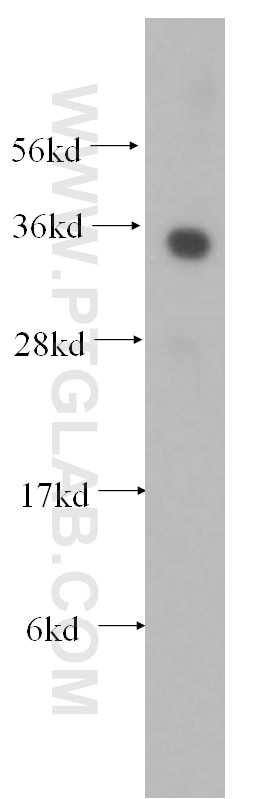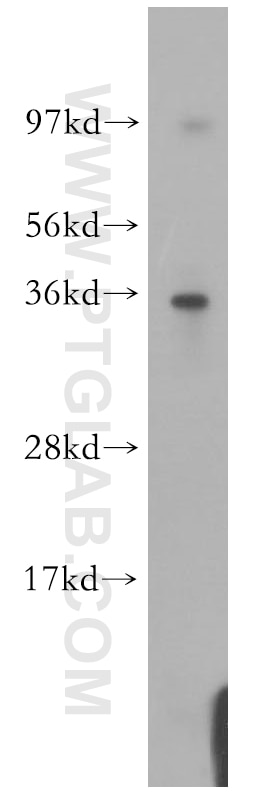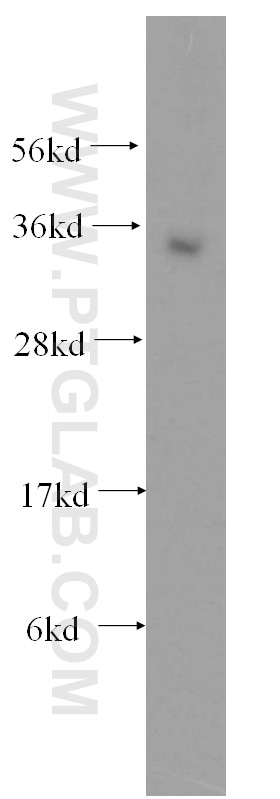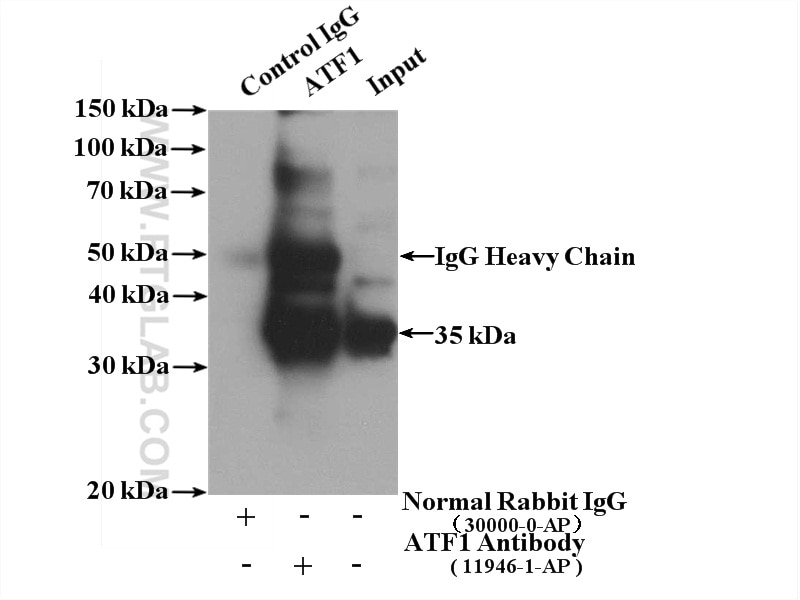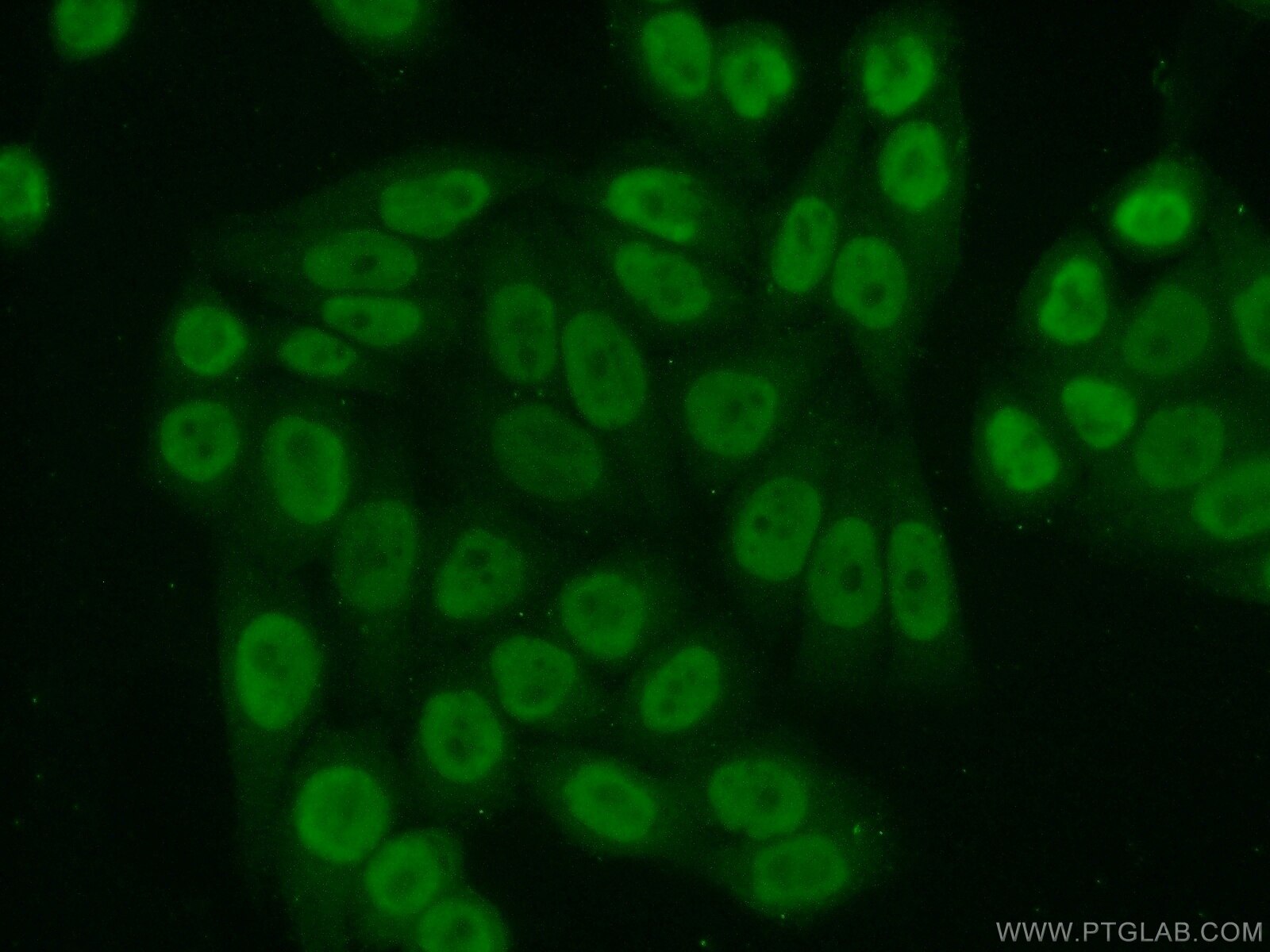- Featured Product
- KD/KO Validated
ATF1 Polyklonaler Antikörper
ATF1 Polyklonal Antikörper für WB, IF/ICC, IP, ELISA
Wirt / Isotyp
Kaninchen / IgG
Getestete Reaktivität
human und mehr (1)
Anwendung
WB, IHC, IF/ICC, IP, ELISA
Konjugation
Unkonjugiert
Kat-Nr. : 11946-1-AP
Synonyme
Galerie der Validierungsdaten
Geprüfte Anwendungen
| Erfolgreiche Detektion in WB | HeLa-Zellen, A431-Zellen, humanes Hirngewebe |
| Erfolgreiche IP | HeLa-Zellen |
| Erfolgreiche Detektion in IF/ICC | HeLa-Zellen |
Empfohlene Verdünnung
| Anwendung | Verdünnung |
|---|---|
| Western Blot (WB) | WB : 1:500-1:1000 |
| Immunpräzipitation (IP) | IP : 0.5-4.0 ug for 1.0-3.0 mg of total protein lysate |
| Immunfluoreszenz (IF)/ICC | IF/ICC : 1:50-1:500 |
| It is recommended that this reagent should be titrated in each testing system to obtain optimal results. | |
| Sample-dependent, check data in validation data gallery | |
Veröffentlichte Anwendungen
| KD/KO | See 4 publications below |
| WB | See 9 publications below |
| IHC | See 1 publications below |
Produktinformation
11946-1-AP bindet in WB, IHC, IF/ICC, IP, ELISA ATF1 und zeigt Reaktivität mit human
| Getestete Reaktivität | human |
| In Publikationen genannte Reaktivität | human, Maus |
| Wirt / Isotyp | Kaninchen / IgG |
| Klonalität | Polyklonal |
| Typ | Antikörper |
| Immunogen | ATF1 fusion protein Ag2548 |
| Vollständiger Name | activating transcription factor 1 |
| Berechnetes Molekulargewicht | 271 aa, 29 kDa |
| Beobachtetes Molekulargewicht | 35 kDa |
| GenBank-Zugangsnummer | BC029619 |
| Gene symbol | ATF1 |
| Gene ID (NCBI) | 466 |
| Konjugation | Unkonjugiert |
| Form | Liquid |
| Reinigungsmethode | Antigen-Affinitätsreinigung |
| Lagerungspuffer | PBS mit 0.02% Natriumazid und 50% Glycerin pH 7.3. |
| Lagerungsbedingungen | Bei -20°C lagern. Nach dem Versand ein Jahr lang stabil Aliquotieren ist bei -20oC Lagerung nicht notwendig. 20ul Größen enthalten 0,1% BSA. |
Hintergrundinformationen
TFs play a vital role in maintaining cell homeostasis by combining DNA regulatory sequences to regulate gene transcription rates. Activating transcription factor 1 (ATF1) is a member of the ATF/CREB family of transcription factors (TFs), specifically interacting with the consensus ATF/CRE site 'TGACGTCA'(PMID: 28032861). ATF1 transcriptionally regulates the expressions of target genes to mediate various cellular processes, and ATF1 effects the progression of tumors (including lung cancer, colorectal cancer,and nasopharyngeal carcinoma).
Protokolle
| Produktspezifische Protokolle | |
|---|---|
| WB protocol for ATF1 antibody 11946-1-AP | Protokoll herunterladen |
| IF protocol for ATF1 antibody 11946-1-AP | Protokoll herunterladen |
| IP protocol for ATF1 antibody 11946-1-AP | Protokoll herunterladen |
| Standard-Protokolle | |
|---|---|
| Klicken Sie hier, um unsere Standardprotokolle anzuzeigen |
Publikationen
| Species | Application | Title |
|---|---|---|
Am J Hum Genet Systematic Functional Interrogation of Genes in GWAS Loci Identified ATF1 as a Key Driver in Colorectal Cancer Modulated by a Promoter-Enhancer Interaction.
| ||
Mol Ther Nucleic Acids Mbd2 deficiency alleviates retinal cell apoptosisvia the miR-345-5p/Atf1 axis in high glucoseinjury and streptozotocin-induced diabetic mice. | ||
Front Cell Dev Biol CREB1 and ATF1 Negatively Regulate Glutathione Biosynthesis Sensitizing Cells to Oxidative Stress.
| ||
J Biol Chem The mRNA levels of heat shock factor 1 are regulated by thermogenic signals via the cAMP-dependent transcription factor ATF3. | ||
Cells Perilipin 5 Protects against Cellular Oxidative Stress by Enhancing Mitochondrial Function in HepG2 Cells. |
